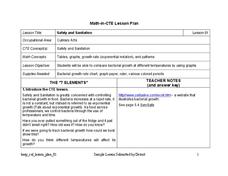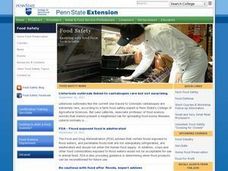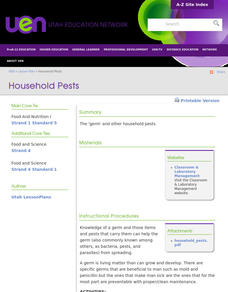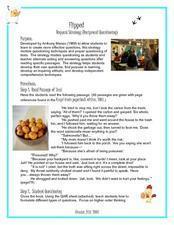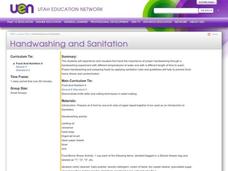Serendip
Understanding and Predicting Changes in Population Size – Exponential and Logistic Population Growth Models vs. Complex Reality
Salmonella poisoning impacts over 200,000 people in the United States each year. Scholars learn about the growth of these bacteria using multiple approaches. Then they apply the same growth calculations to endangered species and think...
National Research Center for Career and Technical Education
Safety and Sanitation
Your microbiologists explore the graphing of exponential growth functions using bacteria, like e. coli and salmonella, in a well-written, career and technology lesson.
Curated OER
Farm * Examination 2
In this assessment, 10th graders Match the vocabulary terms in column A with the definitions in column B. Write the letter of the definition in column B in the space next to the terms in column A. Upon completionof the first task,...
Curated OER
Rat-ional Pet Concerns
Students explore a recent salmonella outbreak in young students linked to pet rodents. They create pamphlets to help assist and inform pet owners about the disease and necessary health precautions.
Curated OER
Food Poisoning
Identify strategies that prevent food-borne illnesses and contamination. National Standard 14.4.1 Identify food-borne illness Identify types of food-borne illness and their symptoms: botulism, e-coli, hepatitis, salmonella, staphylococci...
Curated OER
Household Pests
Identify methods that prevent food-borne illnesses and contamination. National Standard 14.4.1 Identify food-borne illness Identify types of food-borne illness and their symptoms: botulism, e-coli, hepatitis, salmonella, staphylococci...
Curated OER
Health: Food Borne Illnesses
Students discover how to inhibit food borne illnesses by practicing safe food-handling techniques. Among topics they examine are the advantages and disadvantages of using wooden or plastic cutting boards. After studying for the test,...
Curated OER
Investigating Osmosis
A thorough investigation of cell transport is provided when completing the assignment. The first half requires biology class members to answer questions about diffusion and osmosis with the aid of diagrams. Then they fashion an...
Curated OER
Flipped: Request Strategy
Break your class into groups and have them read certain passages from the text Flipped (included here). After every two paragraphs, the groups stop to answer the questions included. Which questions provided are right there questions?...
American Museum of Natural History
The Tree of Life
Groups of species can have more in common than meets the eye. An interactive cladogram shows some of the connections between important groups of species. Learners click on sections of the diagram to learn more about the connections or on...
Curated OER
Nutrition Action - Safe Food Quiz
Multiple-choice and true-false questions assess your high schoolers' understanding of food safety. This is an interactive worksheet in which learners can click on the correct answers to discover explanations. You could type the questions...
Curated OER
March Answer Key
For this Easter worksheet, students read a letter to their parents. The 10 words in italics can also be removed in order to create a fill-in-the blank exercise.
Curated OER
Epidemic, Plague, and Infection
Students recognize disease vectors (pathways) and risk factors for infectious diseases.
Curated OER
Microbe Detective Story
Students play the parts of members of a microbe detective team. They solve the mystery of students stricken with chills, vomiting, and diarrhea after a picnic. They research different microbes and look for appropriate antibiotics.
Curated OER
Microbes and Our Food
Students investigate foodborne illnesses and involved microbes. They identify major pathogens and then research and explain how they contaminate foods and how people are affected.
Curated OER
Handwashing and Sanitation
Students experience and visualize first hand the importance of proper hand washing through a hand washing experiment with different temperatures of water and with a different length of time to wash. They prevent food-borne illness and...
Curated OER
Food Safety to Prevent Food-Borne Illness
Students examine strategies and guidelines to prevent food-borne illnesses and contamination through proper handwashing, handling of foods, and food preparation. They review fact sheets on food-borne illnesses, and watch and discuss...
Curated OER
Prokaryote Coloring
In this prokaryote activity, students answer ten questions about prokaryote cells and they color a diagram of a simple bacteria cell and its structures.
Curated OER
Scale of Organisms
In this scale worksheet, students use the SI system to compare the sizes of some of the smallest and largest organisms on Earth. This worksheet has 7 problems to solve.
Curated OER
Fact and Opinion: How to Tell the Difference
Students explore reasoning by completing a worksheet activity in class. In this fact vs. opinion lesson, students identify the differences between a personal opinion and something that is factually true. Students identify several...
Curated OER
Epidemic, Plague, and Infection
Young scholars investigate the illness borne in concentration camps. In this Holocaust lesson, students participate in a simulation that requires them to consider how ailments became epidemics in concentration camps.
Curated OER
Food Poisoning
Students study the prevention of the four major types of food poisoning. They write a letter of advice to an imaginary friend who has had food poisoning seven times within the last year.
Curated OER
Easter Animals Worksheet
In this science worksheet, students take the time to think of why animals should not be given as gifts on the Easter Holiday. They fill in the letter with the appropriate vocabulary word.
Curated OER
Prokaryote Coloring
In this prokaryote coloring activity worksheet, 7th graders read an informative passage about prokaryotes. Students answer questions about the passage and color the picture.



